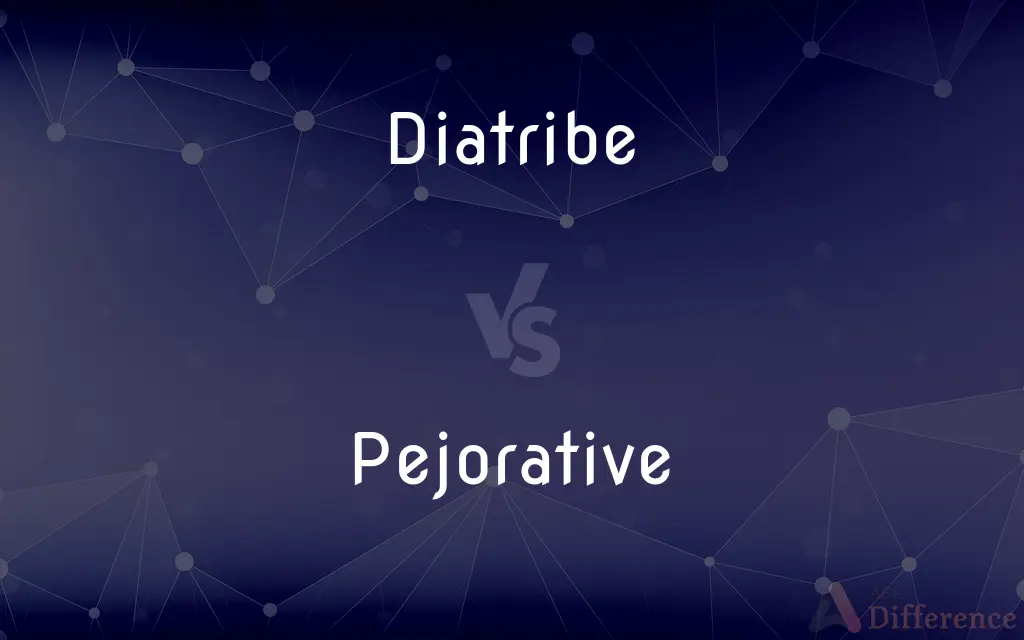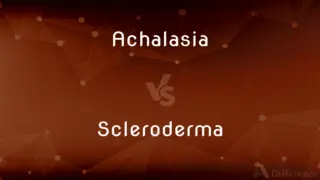Diatribe vs. Pejorative — What's the Difference?
Edited by Tayyaba Rehman — By Fiza Rafique — Updated on September 27, 2023
A Diatribe is a bitter, sharp criticism or attack in speech or writing, while a Pejorative is a word or phrase expressing contempt or disapproval.

Difference Between Diatribe and Pejorative
Table of Contents
ADVERTISEMENT
Key Differences
Diatribe and Pejorative both relate to negative expressions, but they operate differently within language. A Diatribe is often an extended verbal or written assault against someone or something, characterized by bitterness and sharpness. In contrast, a Pejorative is not an extended discourse but rather a term that, by its very nature or use, diminishes or shows disdain for its subject.
A writer might pen a Diatribe against a particular policy, detailing extensively why it's flawed and detrimental. This prolonged criticism would be full of strong and aggressive language. On the other hand, in casual conversation, one might use a Pejorative term to refer disparagingly to a person, group, or concept, instantly conveying disapproval or contempt without the need for extended argumentation.
While a Diatribe seeks to convince or express deep-seated anger, a Pejorative word or phrase serves to label and, often, demean. For instance, a newspaper editorial might launch a Diatribe against a corrupt politician, utilizing evidence and rhetoric. Simultaneously, a person might employ a Pejorative to dismissively label an entire group, without any supporting argument.
Comparison Chart
Definition
An extended bitter criticism or rant
A word/phrase expressing contempt or disapproval
Length
Typically longer, detailed
Usually a single term
ADVERTISEMENT
Purpose
To express deep-seated anger or to convince
To label or demean
Context of Use
Often found in opinion pieces, speeches
Used in daily conversation, writings to convey disdain
Nature
More about the content and length of criticism
Focuses on the inherent negativity of specific terms
Compare with Definitions
Diatribe
A long and aggressive speech or piece of writing.
His article was a Diatribe against mainstream media.
Pejorative
A term that expresses contempt or disapproval.
Calling someone lazy is a Pejorative descriptor.
Diatribe
An extended criticism or rant.
Her Diatribe on corporate greed lasted for over an hour.
Pejorative
A term expressing negative connotations.
Bureaucrat can be a neutral term, but it's often used as a Pejorative.
Diatribe
A discourse filled with sharp criticism.
He went on a Diatribe about the decline in educational standards.
Pejorative
A derogatory word or expression.
He used a Pejorative term to describe the opposing team.
Diatribe
A forceful and bitter verbal attack.
The politician's speech turned into a Diatribe against his opponents.
Pejorative
A word that belittles or negatively values something.
Using alternative facts as a Pejorative quickly gained popularity.
Diatribe
A vehement denunciation.
The professor's Diatribe against plagiarism was both powerful and enlightening.
Pejorative
A word that diminishes the subject in the eyes of the listener.
Labeling someone as naive can be Pejorative, implying a lack of experience or judgment.
Diatribe
A diatribe (from the Greek διατριβή), also known less formally as rant, is a lengthy oration, though often reduced to writing, made in criticism of someone or something, often employing humor, sarcasm, and appeals to emotion.
Pejorative
A pejorative or slur is a word or grammatical form expressing a negative or a disrespectful connotation, a low opinion, or a lack of respect toward someone or something. It is also used to express criticism, hostility, or disregard.
Diatribe
A forceful and bitter verbal attack against someone or something
A diatribe against consumerism
Pejorative
Expressing contempt or disapproval
Permissiveness is used almost universally as a pejorative term
Diatribe
A bitter, abusive denunciation.
Pejorative
A word expressing contempt or disapproval
Most of what he said was inflammatory and filled with pejoratives
Diatribe
An abusive, bitter verbal or written attack, criticism or denunciation.
The senator was prone to diatribes which could go on for more than an hour.
Pejorative
Disparaging; belittling
"The label Neandertal took on a pejorative connotation decades ago.
It implied boorishness at best and stupidity at worst" (Craig Stanford).
Diatribe
A prolonged discourse; a long-winded speech.
Pejorative
A disparaging or belittling word or expression.
Diatribe
A prolonged or exhaustive discussion; especially, an acrimonious or invective harangue; a strain of abusive or railing language; a philippic.
The ephemeral diatribe of a faction.
Pejorative
Disparaging, belittling or derogatory.
Diatribe
Thunderous verbal attack
Pejorative
A disparaging, belittling, or derogatory word or expression.
Pejorative
Implying or imputing evil; depreciatory; disparaging; unfavorable.
Pejorative
Expressing disapproval;
Dyslogistic terms like `nitwit' and `scalawag'
Common Curiosities
Why are Pejorative terms problematic in discourse?
Pejorative terms can shut down productive conversation by labeling and demeaning, rather than addressing arguments.
What is a Diatribe usually aimed at?
A Diatribe is typically aimed at a person, group, or concept to express strong disapproval or criticism.
Can a Diatribe be written?
Yes, a Diatribe can be both spoken or written, and is characterized by its aggressive criticism.
Can a Pejorative term ever be positive?
No, by definition, a Pejorative term has negative or derogatory connotations.
Is every criticism a Diatribe?
No, a Diatribe is a particularly bitter and extended criticism, while not all criticisms are that intense or lengthy.
Share Your Discovery

Previous Comparison
Cia vs. Dia
Next Comparison
Achalasia vs. SclerodermaAuthor Spotlight
Written by
Fiza RafiqueFiza Rafique is a skilled content writer at AskDifference.com, where she meticulously refines and enhances written pieces. Drawing from her vast editorial expertise, Fiza ensures clarity, accuracy, and precision in every article. Passionate about language, she continually seeks to elevate the quality of content for readers worldwide.
Edited by
Tayyaba RehmanTayyaba Rehman is a distinguished writer, currently serving as a primary contributor to askdifference.com. As a researcher in semantics and etymology, Tayyaba's passion for the complexity of languages and their distinctions has found a perfect home on the platform. Tayyaba delves into the intricacies of language, distinguishing between commonly confused words and phrases, thereby providing clarity for readers worldwide.














































